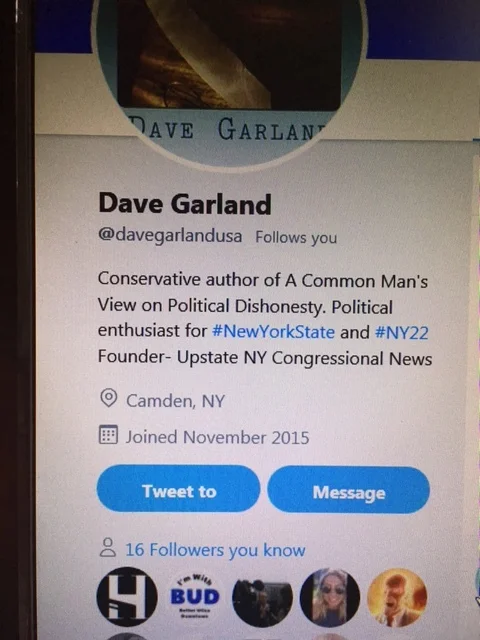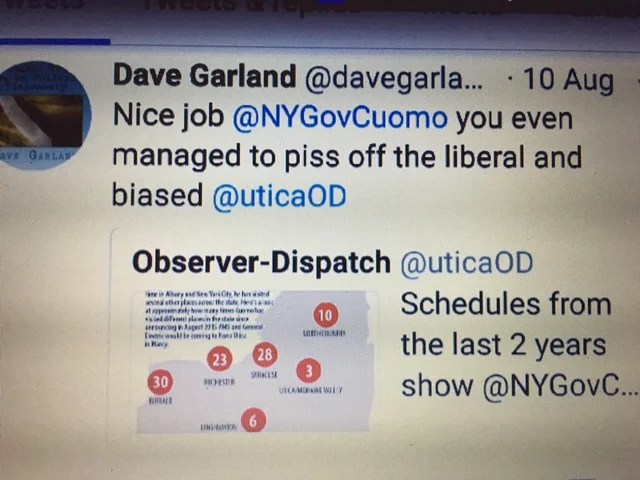NY-22 Minute: The Next Frontier of Opposition Communication By Luke Perry
Followers of “Dave Garland,” a frequent social media commentator on NY-22, recently learned via Twitter this is a pseudonym for Patrick O’Brien, Communications Assistant for Congresswoman Claudia Tenney.
Mr. O’Brien adopted the pen-name a few years ago as an undergraduate student at Western New England University. O'Brien explained this in a promotional video on Facebook for his self published book, The Common Man’s View on Political Dishonesty.
Garland’s Twitter account (@davegarlandusa) retweeted Congresswoman Tenney and regularly criticized Anthony Brindisi after he became Tenney’s opponent in the 2018 midterm. Patrick O’Brien’s LinkedIn profile lists the authorship of his book between interning for Tenney’s campaign and working for her office. Claudia Tenney (@claudiatenney) and Hannah Andrews (@and_hannah), Tenney’s Communications Director, followed Garland on Twitter.
"Dave Gardland" wrote a letter-to-the-editor of The Observer Dispatch in support of Claudia Tenney and recently created a new blog entitled “Upstate NY Congressional News,” the purpose of which was “to fight major media bias” in NY-22, NY-19, NY-21, and NY-24. The opening feature, subtitled “Fighting Dishonesty Together,” was devoted to “giving a voice to upstate conservatives” by offering to publish their letters.
Garland’s social media accounts and blogs have been taken down since his identity was revealed. This situation raises several questions about political communication and the health of American democracy in NY-22 and beyond.
Is this the new normal? Will elected representatives and/or their staffers recreate themselves digitally in the post-truth era? What are the consequences for democracy?
“Dave Garland” could be a recent college graduate experimenting with the boundaries of political reality. Reality has blurred over recent decades with the rise of partisan 24 hour cable news networks, reality TV, the internet, blogging, and social media. Moreover, rapid advances in digital communication have unfolded in conjunction with infinite opportunities for digital anonymity.
“Dave Garland” could also have been an in-house strategic maneuver or a play from a party playbook. Congressional campaign committees are looking to find every possible advantage as are the candidates they support. The 2016 election witnessed the rise of new forms of digital attacks by campaigns and foreign powers. Contrived personas may portend the next frontier of opposition communication.
Neither of these possibilities are good for democracy. Democracies require basic transparency by those in power and accountability to those who are not. This constitutes a dangerous new norm should it become a routinized part of American electoral politics.
Luke Perry (@PolSciLukePerry) is Chair and Professor of Government at Utica College.
Read the NY-22 Minute for timely and comprehensive analysis of the campaign.





